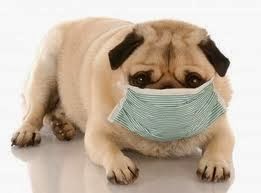Tuesday's Tips from our Doctors!
Recently our Doctors asked how they could share some facts about the common (and not so common) things that can effect the health of our pets in S. Florida. This is what we can up with. Be on the look out for more Tips from our Doctors and be sure to let us know what other things you would like to know about!

The infamous “Kennel Cough” is the
canine equivalent of a child coming home from school or a friend’s house and
coming down with the “flu” soon after. In terms of Kennel Cough, there are many
“bugs” at play as opposed to just the “flu”, and many of these bugs can work
together to create a more severe infection. Kennel Cough is medically termed,
infectious tracheobronchitis, or inflammation of the trachea and the
bronchi(the airways of the lungs). The disease often starts with a virus, either
canine parainfluenza virus(CPiV) and canine adenovirus 2(CAV2) at the most
commonly associated viruses. Other more life threatening viruses have been
isolated, but due to widespread vaccination, are far less common. CPiV and CAV2
are acquired through interaction with other dogs and inhalation/consumption of
viral particles, whether it be from a sneeze, playing with a toy or object
another dog recently played with, or very close contact between a dog that has
been infected. Both viruses target the cells of the respiratory tract, damaging
and paralyzing the defense mechanisms, such as cilia(or microscopic hairs)
responsible for removing debris and helping to remove pathogens from the
respiratory tract. This allows for bacteria that either naturally inhabit the
respiratory tract(commensal bacteria) or pathogenic and infectious bacteria to
colonize and wreak havoc on the respiratory tract, further increasing the
severity of clinical signs.
The
bacteria associated with Kennel Cough is Bordatella
bronchiseptica This bacteria is capable of infecting a
dog indepedently, or with the help of the viruses listed above. Just like the
viruses, it is spread via transmission of respiratory secretions and objects
that have been contaminated. Studies have shown that nearly 50% of normal,
healthy dogs may have Bordatella in
their respiratory tract, allowing spread of infection from playmates without
the infectious dog appearing sick! Another pathogen implicated in kennel cough,
is Mycoplasma, a primitive bacteria. Mycoplasma is known for its ability to
create a biofilm or layer of slime that allows it remain in the body and
protects it from host defense mechanisms as well as antibiotic therapy.

The main signs associated with “Kennel Cough” are sudden
coughing episodes often accompanied by retching and coughing up phlegm in an
otherwise normal dog. A characteristic “goose
honk” associated with kennel cough is theorized to be a result of swelling of
the larynx or voicebox. Mucoid discharge from the eyes and nose is also recognized.
In more severe cases, loss of appetite, fever and appetite may be observed.
These signs often begin 3 to 10 days after exposure. In severe cases, pneumonia
may occur, leading to respiratory distress and difficulty breathing.
Diagnosis of the pathogens involved in kennel cough is often
difficult, as many of the viruses involved do not infect for a long period of
time. Recovering bacteria from infected dogs is sometimes helpful, however
there is often contamination from normal inhabitants in the respiratory tract
and it is often hard to differentiate.
Treatment involves controlling discomfort as a result of the
irritation caused by the pathogen including anti-tussives(anti-cough) and
anti-inflammatories as well as antibiotics which target, not only the bacteria
implicated in kennel cough, but those that are opportunistic, or taking
advantage of the weakened immune system. In severe cases, nebulization may be
indicated. Most cases however, are self-limiting, or resolve on their own.

Prevention is key, and involves sanitation and vaccination.
Vaccination can be performed as early as 2 to 3 weeks if the dog is living in a
high-risk environment. Studies of the intranasal and injectable versions of the
vaccine have been shown to significantly lessen the severity clinical signs.
Boosters should be given 3 to 4 weeks after the first injection. The vaccine
shows long lasting immunity for the viruses involved, but short duration for
Bordatella, the main bacterial player,
lasting from 3 months to 10 months. The recommendation is to administer the
vaccine at least 5 days prior to potential exposure (boarding, showing, and
other high r
isk activities.) if the dog has not had the
vaccination within 6 months.
Cornell University, 2015
VCA HAH First Year Associate












